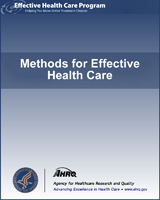NCBI Bookshelf. A service of the National Library of Medicine, National Institutes of Health.
Leavy MB, Cooke D, Hajjar S, et al. Outcome Measure Harmonization and Data Infrastructure for Patient-Centered Outcomes Research in Depression: Report on Registry Configuration [Internet]. Rockville (MD): Agency for Healthcare Research and Quality (US); 2020 Nov.

Outcome Measure Harmonization and Data Infrastructure for Patient-Centered Outcomes Research in Depression: Report on Registry Configuration [Internet].
Show detailsPsychPRO, a national mental health registry, was established to help psychiatrists and mental health professionals validate quality patient care through measurement and analysis to discover opportunities for improvement, avoid payment penalties and instead achieve bonuses for meeting quality reporting requirements, deploy cutting-edge technology to minimize the burden of data collection and reporting, and achieve optimal patient outcomes using tools to measure, chart, and benchmark clinical care. The PsychPRO Registry has over 600 active clinicians participating from 46 States and data on over 180,000 patients.
PsychPRO captures individual level clinical data that is generated and documented during the course of patient treatment and care. Data are electronically extracted directly from EHRs and from online portals. Data fields and elements vary with respect to standardization and include structured and unstructured data. Data include: patient demographic data; diagnosis(es) and intervention(s) (e.g., medications, therapy); encounter data; patient-reported outcomes; and limited provider details.
Data in PsychPRO are collected during routine assessment and clinical care of patients and used primarily to support a practice’s quality improvement activities and quality reporting to the Center for Medicare and Medicaid Services. Only de-identified data can be secondarily used for research and this project. As such, patient informed consent and IRB approval are not required. However, participating sites are not precluded from seeking IRB approval.
To participate in this project, PsychPRO recruited 10 pilot sites from existing registry sites, added the measures to the registry platform, and submitted the project for IRB review. These steps are described further below.
Pilot Site Recruitment
The American Psychiatric Association (APA) focused on recruiting sites that are existing participants in the registry, are currently submitting data, and are using the PHQ-9 as part of their usual patient care. These inclusion criteria were important to have sites that were ready to begin data collection in March 2020. Because the registry includes a range of practice types and settings, this process was expected to return some variation in sites targeted for recruitment. APA identified eligible sites, invited them using an email invitation, and obtained commitments from 10 sites to participate. Table 3 provides descriptive information about the PsychPRO pilot sites.
Table 3
PsychPRO pilot sites.
Adding Measures to the Registry Platform
As with the PRIME Registry, APA began the process of adding the measures to the registry platform by comparing the harmonized measure definitions to the registry data dictionary. Questions identified during this process are discussed further in the Key Findings section below.
APA then provided specifications to the registry technical vendor and worked with the vendor to extract the necessary data and calculate and display the measures in the appropriate locations. Because APA and ABFM work with the same registry technical vendor, the process is similar to the steps described above.
IRB Review
APA provided the study protocol and IRB documentation to its local IRB for review on February 12, 2020. The project was determined to not be human subjects research for the following reasons: there are no human subjects involved, collection of data is for clinical practice and quality improvement purposes only, and analyses use de-identified data only. The determination was received on February 20, 2020, and a final letter of approval was obtained on March 6, 2020.
- Measure Calculation in PsychPRO - Outcome Measure Harmonization and Data Infrast...Measure Calculation in PsychPRO - Outcome Measure Harmonization and Data Infrastructure for Patient-Centered Outcomes Research in Depression: Report on Registry Configuration
- Conclusions - Outcome Measure Harmonization and Data Infrastructure for Patient-...Conclusions - Outcome Measure Harmonization and Data Infrastructure for Patient-Centered Outcomes Research in Depression: Report on Registry Configuration
Your browsing activity is empty.
Activity recording is turned off.
See more...